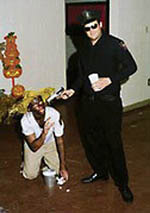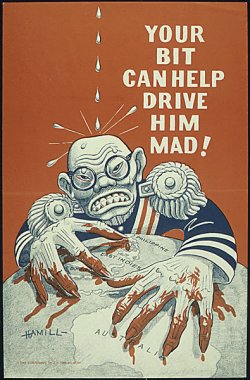Sean Martin at common sense philosophy and Richard Chappell at Philosophy, et cetera have lately been puzzling over the claim that so-called sentences such as Caesar is a prime number
are not false, but rather meaningless. They’re both inclined to think that this is wrong: it seems obvious enough that there’s a set of all prime numbers, and that Caesar isn’t in it (since everything in it is, inter alia, a number, and Caesar is not), so Caesar is a prime number
is simply false. I think that the claim is meaningless rather than false, and that their attempt to give it a meaning commits a classical error in philosophy, of the sort exposed by Wittgenstein in both his earlier and his later work. But this will take some explaining.
To get an idea of why I take Caesar is a prime number
to be meaningless, it will actually help to consider the psychological story that Richard suggests to deflate the intuition that it is meaningless. (I think Richard’s on to something in his story, but I think that it has more than a merely psychological bite.) He wonders if some might be tempted to deny it meaning simply because it is so very false, necessarily and obviously so, that no-one would ever even dream of seriously entertaining the thought that it might be true. Then, rather like how something might be so cold that it burns
, so some sentences might be so false that they no longer seem it.
I think that this is in fact the right track to be on, but to see why it actually supports the intuition for regarding Caesar is a prime number
as meaningless rather than false, we need to observe that the difference between this mistake and the mistake involved in humdrum falsehoods such as Caesar was a barkeep
is a difference in kind, not merely a difference in degree.
Think about it this way. Suppose that I — intending to say something true in the English language — say Caesar was a Greek.
Ordinarily we would take this sentence to be both meaningful and false: Caesar was a Roman, not a Greek. So when I said it, I made a mistake; but there is an open question as to what sort of mistake I made, and you’d have to ask some questions to figure out the best way to understand my error. For example, I might have made a factual error about either Caesar, the man, or about Greeks, the category; if you asked why I said that Caesar was a Greek, I might say that I heard that Caesar was born in Athens, and believed it. Or I might have heard that in Caesar’s day, Greece extended from Anatolia to the Pillars of Hercules. Either of these would be flabbergasting examples of historical ignorance; but they would nevertheless be mistakes about Caesar or about the Greeks. On the other hand, it’s possible that my answers might reveal a linguistic mistake, about the word Caesar
or the expression a Greek
. For example, I might have thought that a Greek
meant anyone born in an ancient Mediterranean culture
, or that Caesar
was Plato’s family name. In this case I didn’t make a mistake about Caesar, the man, or Greeks, the category. I just made a mistake about the terms that I was using to express myself, and the way to correct me would not be to teach me some history, but rather to clear up my misconceptions about what Caesar
and a Greek
mean in the sentences in which they are used.
Now let’s return to Caesar is a prime number.
Suppose, again, that I said this, and that I wanted to say something true in the English language. What sort of mistake could you understand me as having made? Is there any conceivable matter of fact about Caesar, the man (or prime numbers) that I could be misinformed about which would explain my thinking that Caesar is a prime number? I can’t think of any conditions under which that kind of error would explain the utterance. The only cases that I can conceive, so far as I can tell, are cases in which there is a mistake about meaning, that is, in which I just haven’t got any sort of cognitive connection between my use of Caesar
and a prime number
in the sentence, and the actual man Caesar or the actual set prime numbers. Maybe I had been taught that Caesar
was a name for a constant (equal to 3, say). Or maybe I thought that prime number
was a way of saying a powerful member of Roman society.
Either of these would, again, involve some flabbergasting ignorance, but what’s important to note here is that it’s not ignorance about Caesar or ignorance about prime numbers. Any position I might be in, such that it would explain my uttering Caesar is a prime number
, is just a position in which I haven’t correctly learned how to use the sign Caesar
or a prime number
, in which I’ve made a mistake about the role that they play in the English language. (You might say: Look, I can think of a factual error you might make about Caesar that would make you think he was a prime number. You might have thought that he, Caesar, was an integer greater than zero, not a man.
But do you really think that someone who thinks that Caesar was an integer greater than zero has correctly learned what Caesar means, in any plausible sense of the word meaning
?)
The mismatch here is important: the kind of mistakes you can make that would lead you to utter Caesar was a Greek
may be either factual or linguistic; but the kind that would lead you to utter Caesar is a prime number
are — if what I’ve said is right — only linguistic. That’s a difference in kind between the two cases, and I think it’s a difference in kind that reflects something important about the logical (not just the psychological) status of the two utterances. If you are using English, then when you try to say Caesar is a prime number
you are just not succeeding in meaning anything by it. (You may mean something by it in your own idiolect, but that’s another matter.) Gilbert Ryle famously called this sort of mistake a category mistake
, and Carnap (who is the immediate source of Sean’s puzzlement) explained the mistake by saying that the name Caesar
and the predicate is a prime number
have a particular logical syntax — so that Caesar is a prime number
, even though it fulfills the rules of English syntax, still fails to fulfill the rules of logical syntax, because part of understanding what Caesar
means is understanding that he is not the sort of thing that is either prime or non-prime; and understanding what ____ is a prime number
means is understanding that the predicate can only be ascribed to, or withheld from, a number. I think Carnap’s understanding of the situation is actually gravely mistaken, and Ryle’s description is perhaps misleading (for some detailed reasons why, see Edward Witherspoon‘s Conceptions of Nonsense in Carnap and Wittgenstein in The New Wittgenstein, and Cora Diamond‘s What Nonsense Might Be in The Realistic Spirit). The short of it is that the conclusion is right — Caesar is a prime number
hasn’t got any meaning in English — but the diagnosis is wrong, and wrong because it presumes that Caesar
and —- is a prime number
all have determinate meanings that you can pin down independently of the statements that they occur in; having pinned them down, you can then say Look, the meaning of Caesar
is incompatible with the meaning of —- is a prime number
; if you try to put them together, they just won’t fit.
But expressions have no meaning in isolation; they only get meanings in the context of their significant use within a language (for example, as they are employed in making assertions). If someone goes around saying Caesar is a prime number
I don’t know what he means; I don’t know what he means by Caesar
, or prime number
, or even is a
, at least not until I’ve asked him to explain to the point where I can see the sort of linguistic mistake that he’s making. If I ask him, I may find out that he was trying to say one of the things I mentioned above — for example, that Caesar was a powerful Roman, or that 3 is prime. Or I may find out that he was not asserting anything at all, but rather belting out an example of nonsense for philosophical purposes. Or, I may, after all, find out that he was just babbling, as much as if he had said Blitiri bububu.
The problem isn’t even that Caesar is a prime number
couldn’t have a meaning; I just mentioned a couple meanings it might have. It’s that it doesn’t, because, as people use the words, there isn’t any meaning given to Caesar
in the number-place of a mathematical categorization, or to —- is a prime number
in the predicate-place of a description of a person. Thus Wittgenstein’s claim that philosophical pseudo-problems are of the same kind as the question whether the Good is more or less identical than the Beautiful
(TLP 4.003); the problem with that question
is that — at the very least — no meaning has been given to the sign identical
when it is used as an ordinal predicative adjective.
Now, if I put myself only in the Wittgensteinian position of saying that one or more parts of Caesar is a prime number
hasn’t got a sense, and refuse to take the Carnapian route of saying that they’ve all got senses but those senses entail that the sentence as a whole must not have a sense, then Richard or Sean can always claim that they’ve given the constituent words a commonsensical meaning, and that given those meanings, the sentence is meaningful and false. For example, they both suggest giving Caesar
the sense of Caesar, the man, x is a φ
the sense of x is an element of the set of φ‘s, and prime number
the sense of a whole number that is evenly divisible only by itself and 1. But of course is a member of
is no better off than is a
when I try to imagine a factual error that would explain my saying that Caesar’s a member of the set of prime numbers, and the same thought-experiments that tend to count against the notion of a univocal meaning for is a
, no matter what the subject and predicate nominal are, would also tend to count against the notion of a univocal relation of set membership, no matter what the relata are. If there is some general meaning that encompasses all of Caesar was a Greek,
Caesar was a Roman,
Caesar is a prime number,
3 is an Italian,
3 is a prime number,
3 is an irrational number,
etc. then let them give it — but we have a right to expect that whatever meaning they give will have to make it clear how you could make some mistake about matters of fact, and not just the meanings of terms, that would explain how you could utter the category-error cases above.
And no, I don’t think that an appeal to the primitives of mathematical set theory will help here at all. Of course, sets of numbers, nations of people, orchards of trees, and so on may all have some similar formal features; those formal features may make some parallel treatment according to the schema provided by, say, axiomatic set theory possible. But that no more means that Caesar is a Roman
and 3 is a prime number
express the same relationship than your ability to map planar geometry into polynomial equations using the techniques of analytic goemetry means that geometry really is just algebra (or vice versa). That would also mean that there isn’t any meaningful set consisting of {Caesar, 3, the peach tree in front of my house, …} (since the claim is that no meaning has, so far, been yet given to the notion of a set, or to one or more of the purported elements
of the set). If you had high hopes for a set like that, well, I’m sorry.
A parting note. Richard also wants to know about sentences that use empty designators (such as The present king of France is bald
or Odysseus was set ashore at Ithaca while sound asleep
). Some philosophers (Strawson, for example) think they’re meaningless; others (Russell, for example) that they are false. For what it’s worth, Frege, contrary to popular opinion, did not
think that they are meaningless; but he didn’t think they were false either. He thought that they express a thought but have no truth-value (see my exegetical comments at Philosophy, et cetera). But I think that Frege clearly fails to give us a viable alternative — determinate thoughts are either true or false; what it is to have a determinate sense just is to have truth-conditions which are either met or unmet. As for whether Strawson or Russell is right, though, my suspicion is that either one of them could be right, depending on the sentence. There’s no reason to think that just because some uses of names and definite descriptions are tractable by means of Russell’s theory of descriptions or Strawson’s theory of presupposition, that all of them have to be tractable by the same method. Is Odysseus was set ashore at Ithaca while fast asleep
a failed attempt to make an assertion, provided that there was no historical Odysseus? Probably. Certainly Russell’s attempts to gloss names such as Odysseus
or Apollo
with definite descriptions have been failures — see Naming and Necessity for some of the reasons why. Similarly I think that the King of France is bald
probably presupposes rather than asserts that there is a present King of France, and so fails to say anything rather than saying something false. On the other hand, there are cases where it seems quite clear that Russell’s theory of descriptions ought to be applied: someone who says Yesterday I interviewed the present King of France!
has said something that is both meaningful and false. And there are also cases that I think are simply not clear. I’m not sure whether, say, We are all subjects of the Emperor of North America
asserts or presupposes that there is an Emperor of North America; you’d probably need to find out more about the dialogical context in which it was uttered to know whether it asserts falsely or fails to assert.
Richard also wants to know whether the condition that a sentence either violates syntactical requirements or else contains nouns that fail to refer is necessary or sufficient for a sentence to be meaningless. I think that it is not sufficient, for the reasons I give above: there are at least some cases in which sentences with empty designators ought to be treated according to Russell’s theory of descriptions, and those sentences say something false. Nor do I think it is necessary, for there are examples of sentences
that neither contain empty designators nor violate any syntactical rules, but which must be meaningless on pain of contradiction. Here’s an example: This sentence is false.
Here’s another one: Either this sentence is false or God exists.
Clearly the designators in them are not empty: the sentence itself guarantees that they will pick out something. But if there’s any plausible candidate for a syntactic rule that they might be accused of violating, I haven’t found it. If think you’ve got a syntactic rule that you can cite to rule these sentences
out, then go ahead, make my day.





















